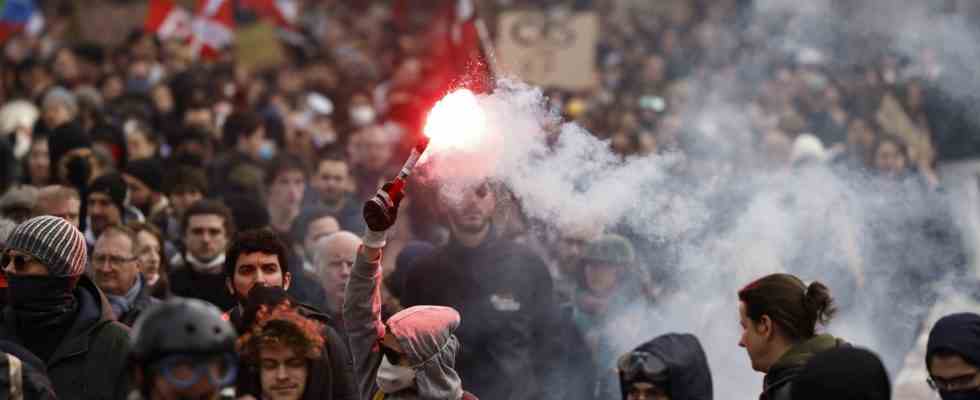Status: 03/29/2023 04:15 a.m
The protests in France against the pension reform have again led to riots in several cities. 175 police officers were injured, 201 people arrested. Politically, the situation seems more complicated than ever.
Alice was on the road from the start, at almost every demo: “Pretty much all of them! But the last two were really important to me – what’s too much is too much!”
Caroline Dylla
ARD Studio Paris
From the point of view of many young people, this “too much” was the controversial Article 49.3 of the Constitution, Alice believes. The 29-year-old observes that since the government got the pension reform through parliament – without a vote – more young people have come to the demos.
Article 49.3 was really a turning point. Since then, it has not only been about pension reform, but also about democracy. That motivated many young people who followed this process and the vote of no confidence and are now taking to the streets.
Focus on violent minority
At the moment you can see the riots on the edge of the demos in pictures. To put it bluntly, the vast majority of people continue to protest peacefully against the reform. In connection with the riots, the focus has been on the so-called “black blocs” since last week: above all very young demonstrators who the Interior Ministry attributes to the ultra-left scene. The journalist Thierry Vincent has dealt intensively with the “black blocs”.
“They often come from social strata with ‘cultural capital’, i.e. with more privileged access to education and culture. Children of teachers, artists – also journalists,” said Vincent in the evening on the television channel France5. “They don’t have a fixed structure; there are many small, if groups. They like to be there when you don’t expect them – and don’t come when you expect them. Their strength, if you will, is their unpredictability.”
“Small, mobile groups that are very violent”, Friederike Hofmann, ARD Paris
tagesschau24 7:30 p.m., 28.3.2023
political deadlock
Politically, the debate is going neither forward nor backward. On Tuesday, the unions proposed starting a mediation process and appointing independent mediators. The government has rejected this initiative. The project is currently with the Constitutional Council – and Dominique Rousseau believes that it could declare several points unconstitutional. Rousseau is an expert in constitutional law. From his point of view, the parliament, among other things, had too little say.
In the Senate, for example, you used rules that allowed fewer speakers overall, or that allowed you to keep only those amendments that the government introduced or agreed to. And then came Article 49.3! All of that and more is a bit much – it can be argued that this is a glaring, serious and repeated limitation on Parliament’s right to debate legislation in peace.
The Constitutional Council must decide by mid-April. At the moment it seems difficult to imagine that there could be a political compromise by then. After all: Prime Minister Elisabeth Borne apparently wants to welcome the unions at the beginning of the week. The next nationwide day of action is scheduled for next Thursday.
In Paris, 21-year-old Mael is certain that the protests against the reform will continue. From his point of view, the demos are less important than the strikes: “The blockades, the strikes, for example in the refineries. The demos are an indicator of dissatisfaction. But the real movement – it shows up elsewhere .”
Tenth day of protest against the pension reform
Julia Borutta, ARD Paris, March 28, 2023 7:25 p.m

